Nomos Zürich Weltzeit – Review
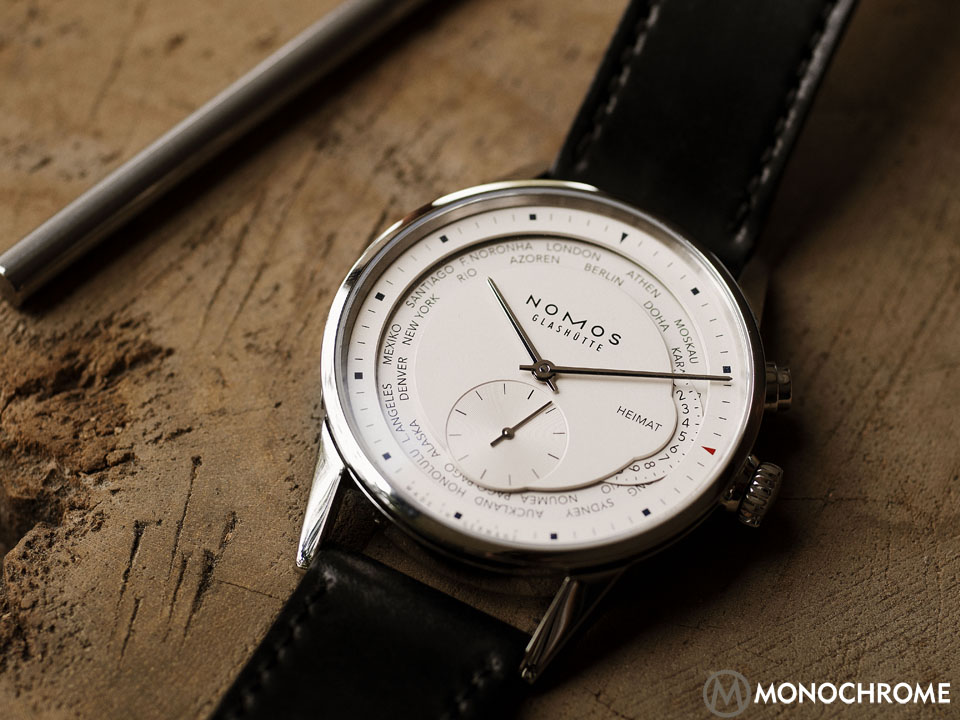
Simplicity strikes a chord in watchmaking design that is unheard of in any industry. Such that a clean dial, with perfect contrast and symmetry catches the purest essence of what a real timepiece should be. But on the other side of the spectrum lies “complications”; each one acting like a single musical note and when meticulously crafted together, it all lines up to create this awe-inspiring sonata to which we horologists call a “grande complication”.
Recently, we were given the chance by Nomos to review their Zürich Weltzeit, albeit not a grande complication, but still equally worth looking into. We came to love Nomos watches for their simple and clean aesthetics, classic dial design with a modern contemporary twist to it. Simplicity in this case has often been their strongest suit. A few months back, we showed you their latest entrants to their collection and also a bit of history about this up and coming brand. In case you missed it, you can read about it here. So after covering one of their latest timepieces and a bit of history with it, it is time to review on one of their finest…

Two years ago, the company decided to one-up their game by introducing a real complication to their collection. A feat that certainly sounds like a far cry from their usual stint, that is to go straight to the opposite end of the spectrum. A very bold move indeed by the company. Taking risks and going against their comfort zone, for some this is simply unimaginable, for some incomprehensible, but yet that risk taking can sometimes be… a good thing. Read on to find out why.
The Nomos Zürich has been around for several years. In fact, the Zürich is practically the company’s most refined timepiece in their current collection. We all know about how this upstart German brand came to be, and how we love all their beautifully crafted in-house made movements. And when the company decided that they were ready for a higher form of watchmaking, the Zürich was introduced as their new top range. As such, the Zürich Weltzeit (World Timer) was born.
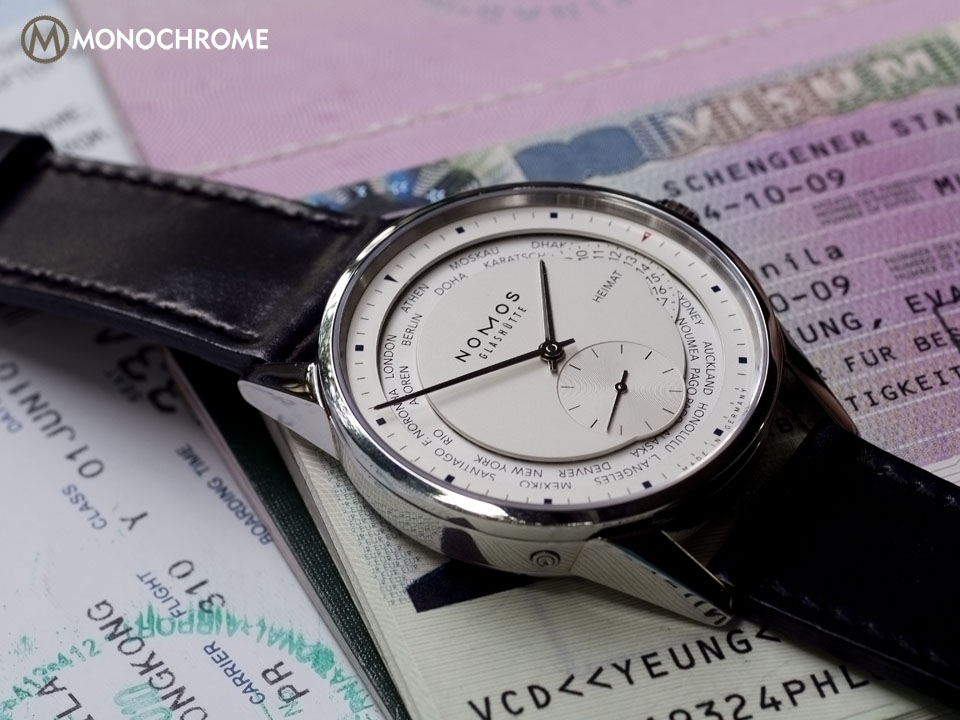
Overall appearance
Out of the box, the Zürich is immaculate. Immediately you’ll see the classic contemporary dial design that Nomos has been known for. The case finishing is definitely top-notch. Nomos did mention that the Zürich was their “most precious”, and I definitely have to nod in agreement that it really is.
One has to ponder though, a German based manufactory naming their most precious timepiece in their collection the “Zürich” – some might find that quite ironic, since the piece bears the Glashütte designation, which is exclusive to watches build by the watchmakers in Glashütte, Germany. Perhaps it’s a sign of respect by the German watchmakers for their Swiss brethren, or maybe the timepiece was in fact inspired from the largest city of that country so beloved for its enviable watchmaking tradition? Food for thought? Maybe that’s a story for another day.
Now moving back to the timepiece at hand, the Zürich Weltzeit still adheres to the bauhaus design concept that Nomos watches live and die by. They have always been the brand that is not built to impress, yet somehow sparks real interest when worn. The very visible city disc, striking dial, and refined case guarantee that, even among regular, non-watch-savvy individuals, you can expect a conversation (and some healthy compliments) to ensue. Even more so when the piece is spotted by a fellow watch connoisseur. The most memorable statement from one of these aficionados perfectly described his experience before parting with the piece; his exact words were, “I was weak in the knees for a good part of a night. Truly such an exquisite timepiece!”

Features
With a quick glance at the dial, the first thing you’ll notice is that apart from the minimalistic markers and hands, the dial is equipped with an inner city disc that circumscribes the main dial. This gives the impression that perhaps you are looking at a world timer complication. And if you happen to think so, then I have to say that you are partly wrong (or partly correct) depending on how you look at things. Here’s why…
Essentially, a world timer complication should allow the wearer to see the time of all different timezones all at once. A complication that has long been revered by frequent travelers who know and value a good timepiece. The Zürich Weltzeit in this regard failed to do just that, as the timepiece is more akin to a GMT or a travel time with a city disc. With the Zürich Weltzeit, you can only view two different timezones simultaneously – the displayed time, and the local or home time shown by the Heimat (Home) disc near the 3 o’clock marker.
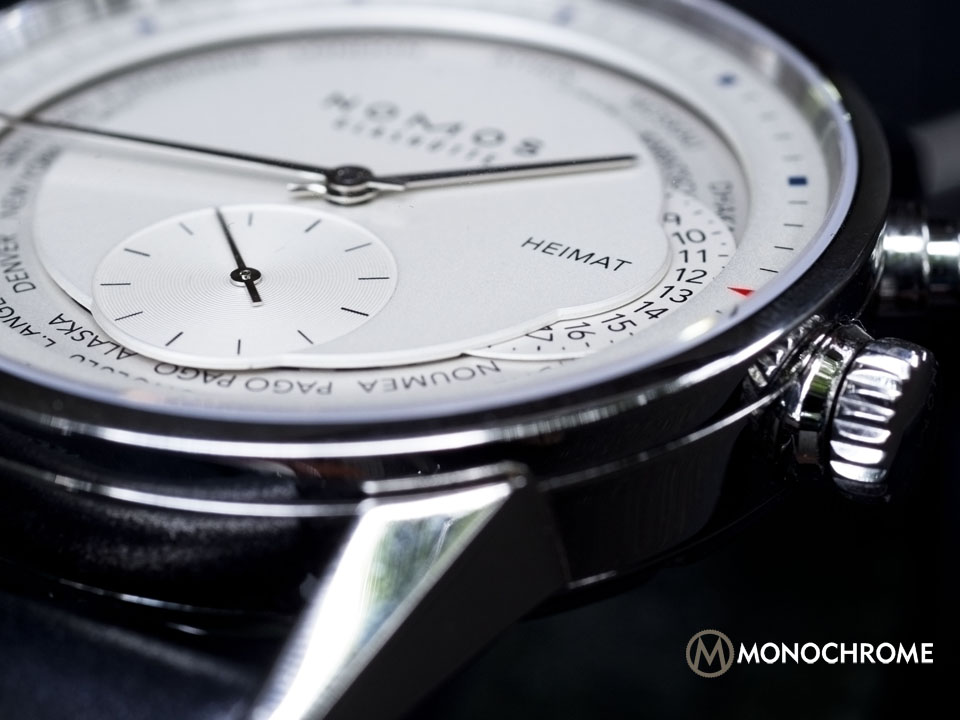
Whatever it may lack in regards to simultaneous viewing, it does make up for with a simple mechanism. Keep in mind that Nomos is pretty serious about making this piece a world timer. They have done so by allowing the wearer to switch time zones easily, at the push of a button. A single press of the 2 o’clock pusher rotates the city disc counter-clockwise, which subsequently jumps the hour hand forward and allows you to flick through the different time zones with ease, while also leaving your heimat disc untouched for you to track the local time. The displayed time in this regard should represent the time zone of whatever city is residing at the 12 o’clock marker. For folks who don’t need to track multiple time zones, an important point to consider is that the heimat disc can also double as a 24-hour indicator. The heimat disc is adjusted at the 8 o’clock push piece, using a well polished Nomos adjusting pin, which is also 100% made in Glashütte.
Case Design
The Zürich comes in all sorts of colors and flavors, all of which use the same stainless steel case design with a beautiful domed sapphire crystal glass. The World Timer however, because of the addition of a complication, increases the thickness of the case by a millimeter and its case comprises ten parts, over the octopartite case of other Zürich models. The case diameter is also very minimally increased, to a near-perfect (in my opinion) case diameter of 39.9mm. This practically puts it in the same size as any modern dress piece. The thin bezel that surrounds the piece gives it the illusion that you are actually wearing something bigger; and it sits there very comfortably on your wrist, sliding under your cuff easily, like it isn’t even there.
The Zürich Weltzeit in comparison with other Nomos pieces has a huge presence in terms of case size, akin to the company’s more fashion conscious line, the Club Automat. But the best take away from it, is that it’s neither too large, nor too small in this day and age – again, threading a fine balance between two polar opposites. I am certainly seeing a theme here: go large and be fashionable, or go small to be timeless. Call it the Goldilocks syndrome if you will; the Zürich in my opinion hit a home run in this regard.
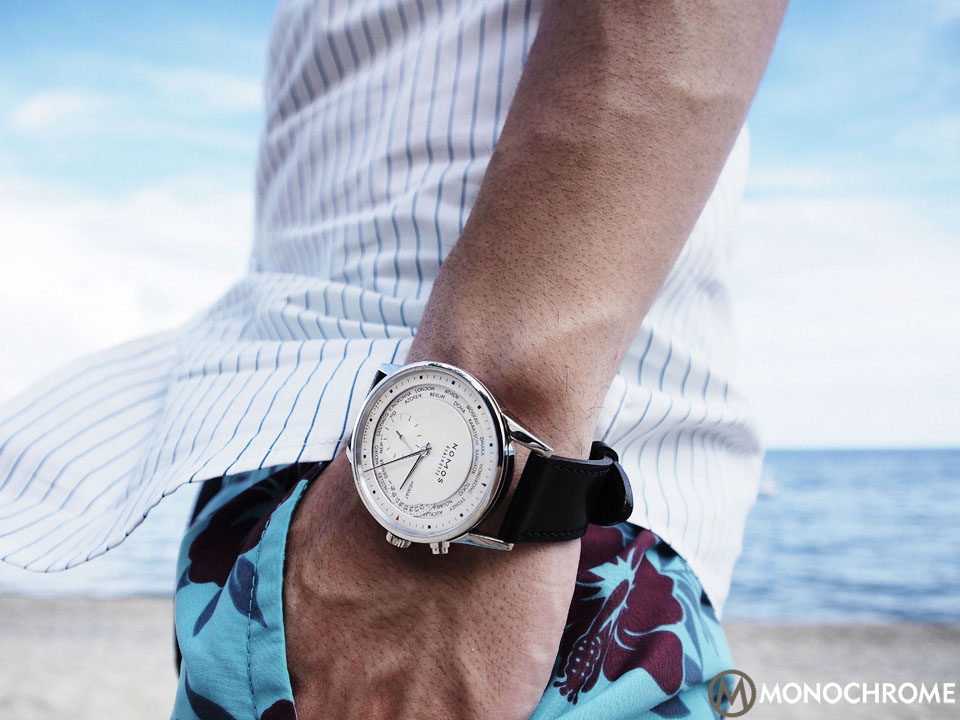
Of course, the size of the case and its proportions are the most obvious part of the design, but the beauty of this Zürich doesn’t end there. The lugs for example, or as Nomos describes them, the case horns are again finely polished with chamfered ends. A small detail for some, but for leather strap pieces, this is a very good thing as it eliminates pricking or scratching the wearer’s skin, certainly a big win in terms of wearability and comfort. Then if you look closer you’ll also see a small separation between the case bezel and the lugs, which doesn’t exactly do anything other than add visual stimulus to the piece that perfectly complements the polished bezel design.
Then there’s the Nomos signed crown at the 3 o’clock and the time zone pusher at 2 o’clock. The pusher clicks very smoothly as described earlier in the features section of this review. The crown is not a screw-down crown, but understandably so, as this permits quick setting if necessary and allows a very fluid hand winding without having to pop the crown out first. The best part from the crown design however, is, again, something that is easily missed and does require a second or even a third look to find. Whereas most watches have nothing between the crown and the case, the Zürich has implemented a small taper, giving it a better grip overall. This subtle inclusion again lends a certain aura of refinement. Going back to the analogy of musical notes, adding together all these small refinements creates this overall finishing that can only be seen on high-end pieces. This beauty really gives off good vibes and emphasizes the noble ambitions of the Nomos watchmakers.
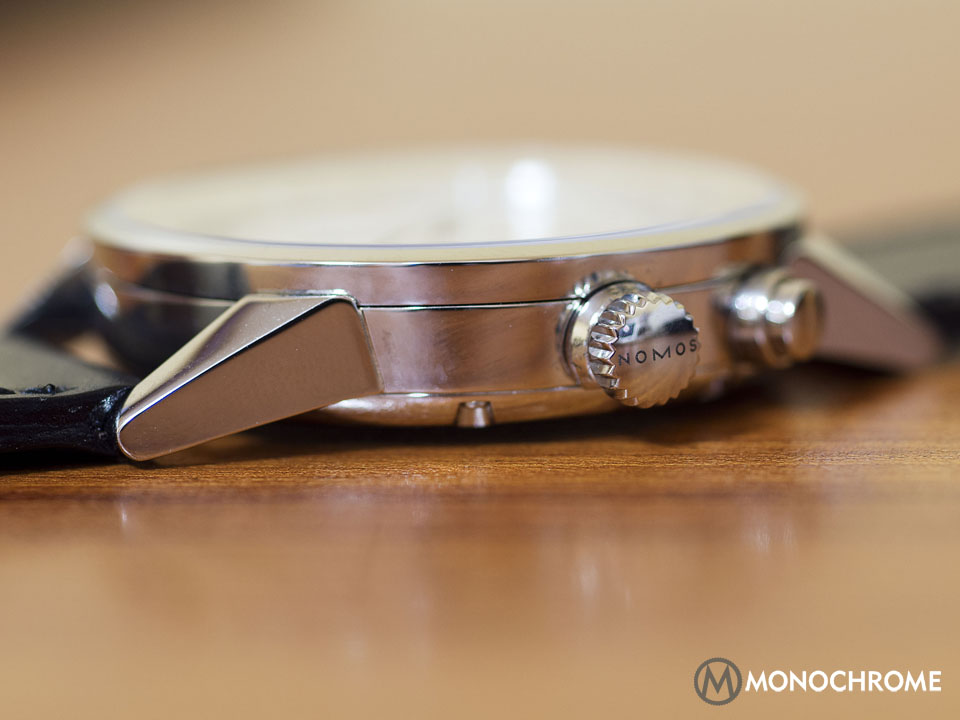
Dial/Hands
Moving on to the dial – or should I say “dials,” with an “s” – which, besides the movement, is the biggest highlight of the piece. It is fitted with two independently rotating discs (apart from the main dial): the city disc and the home time or 24-hour disc. There is also the Nomos signature seconds sub-dial above the 6 o’clock marker that is craftily fitted into the concentric dial(s) design.The circular patterns around the seconds sub-dial are clear signs of Nomos’ attention to small details. Small details, when added together, create this refined overall appearance that we watch nerds would die for. And trust me, there are more of these little details in the Zürich Weltzeit than initially meet the eye. Gone however are the rhodium plated hour markers found on the regular Zürich, replaced by blue and black painted markers. This in effect makes it a bit harder to read the time down to the exact minute. But after a few weeks on the wrist, you’ll soon get accustomed to it, and reading it will simply become second nature. A small hit against legibility, but in return you get this fantastic GMT-esque / World Timer complication that you won’t tire of.
The hands on this piece are rhodium plated – not the typical steel hands you see from their entry level pieces. Not saying that steel hands are a letdown; it’s just that we are looking at a piece that holds the title of being Nomos’ finest. These hands (the small seconds hand included) are very reflective in nature, especially under sunlight (sort of akin to the sunburst effect of other watches.) This effect on the watch hands is intentionally made by its faceted design, and creates a very visible contrast between the hands and the dial. This approach for creating a contrasting effect is different than using the blue colored steel hands on the more humble Tangentes and Tangomats.

Lastly, as with all Nomos pieces, the “Glashütte” label sits below the Nomos insignia. It is a label which German watch lovers have grown to admire, and as if that isn’t enough, a small text is written below the 6 o’clock marker to signify its place of origin and manufacture for the less informed. (A bit too much for me, since the city disc is already visually ‘busy’; but then again this is a clear sign that I’m nitpicking this piece.)
Strap
The Zürich Weltzeit comes with the Nomos signature Horween Shell Cordovan strap. It is built from the finest leather, by the Horween Leather Company in Chicago (hence the name), a place where the most exclusive horse leather is produced. This strap is made of leather taken from the hindquarters of the horse, which I am led believe is the most durable portion because of its fine-pored, smooth skin and water repellant nature. It is highly resistant to wear and tear, and also ages to a nice patina which vintage collectors adore. Nomos actually holds quasi-exclusive rights to the usage of a shell Cordovan made directly from the hindquarters.
Being able to wear the timepiece for a couple of weeks really led me to appreciate the comfort of the Cordovan strap. It is definitely as smooth as described. As a matter of fact, the strap somehow felt even better when worn for long periods, even when compared against the very expensive alligator straps.
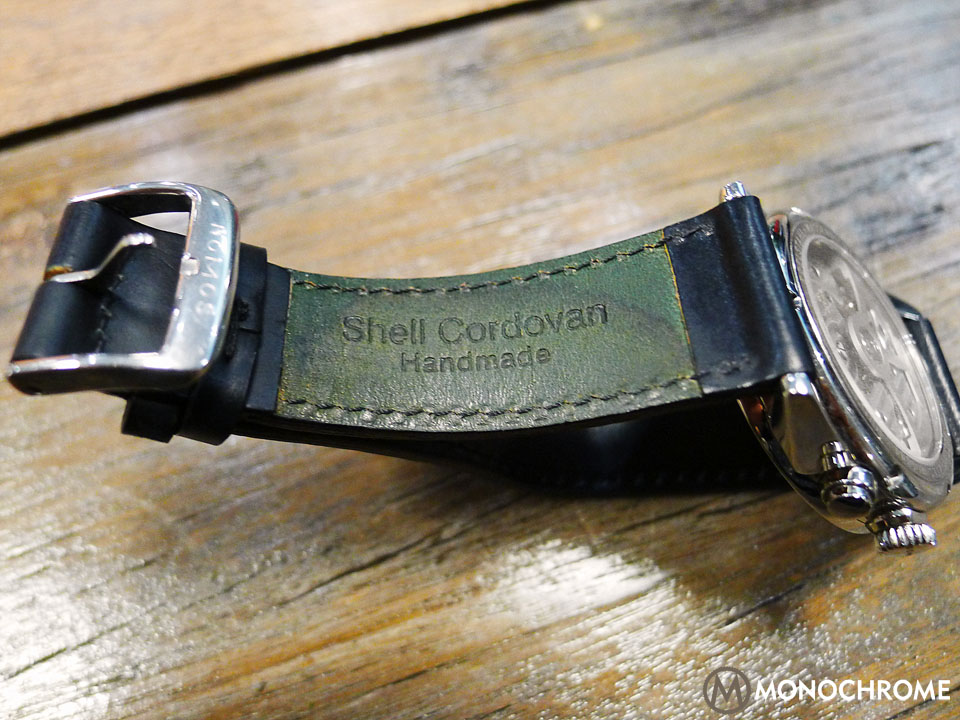
Lastly, I’ve had some fine discussions with a Nomos owner on the subject of straps, and he did make a very valid point on the benefits of strap selection. Given that almost any Nomos watch qualifies as a proper dress piece, it would’ve been better for the company to provide an extra strap for occasions that require a dressier alternative. This is not to say that the Horween strap is a no-go for black tie events, but the option of having an alternative strap in addition to the shell cordovan would indeed be welcomed.
Movement
Now comes the best part of the review – the movement. The machine that powers the timepiece and its unique yet simple complication. What’s ticking inside the Zürich Weltzeit is the Nomos ? (Xi) caliber, perhaps their first movement that offers a full-fledged complication other than a date. And you get a front row seat to it when you flip the watch over: the Zürich Weltzeit is equipped with an exhibition sapphire crystal case back. With a movement this good, who wouldn’t use a crystal case back? Definitely not a thing that should be hidden away, leastwise from the eyes of the owner.
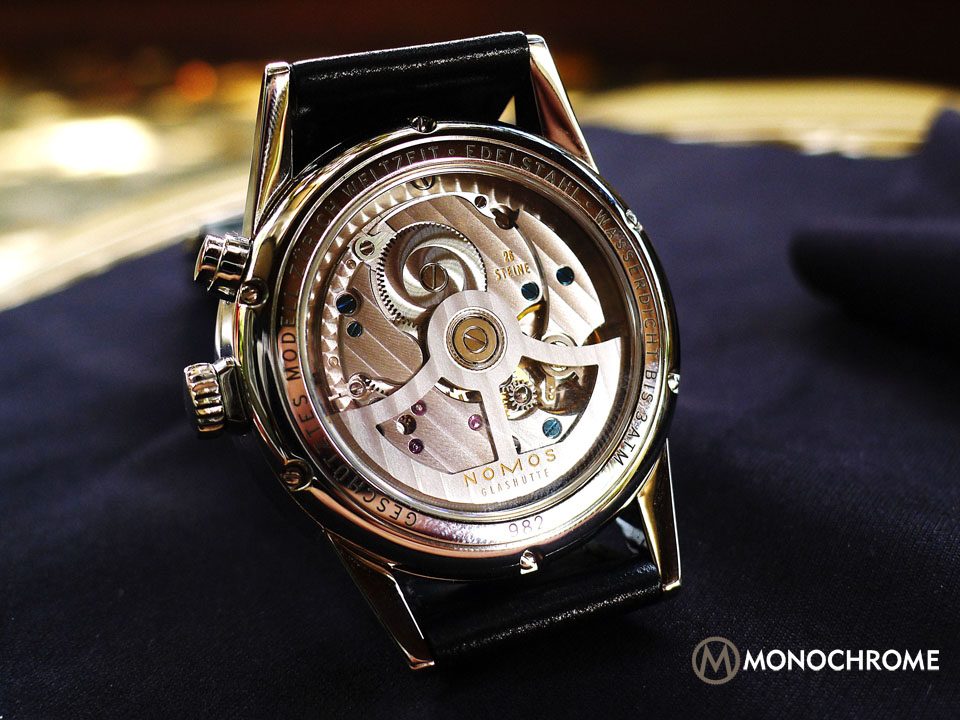
The Zürich Weltzeit however was not the first piece to be fitted with this one-of-a-kind movement. That honor goes to the Tangomat GMT and the Tangomat GMT+. Both use the same rotating disc that shows the second time zone, one through airport codes, and the other through time conversion. The biggest difference with the Zürich Weltzeit however is that the Tangomat GMT shows the second time zone through an aperture window (like a date window), whereas the Zürich Weltzeit shows the full city names visible all around the dial. This essentially eliminates the need for any calculation whatsoever, definitely a significant advantage for the Zürich Weltzeit. Every time zone can be called up by pressing a button repeatedly until the desired place appears at the 12 o’clock, to which the time automatically moves forward if the piece is synched properly.
The decoration of the movement is superb. (Incidentally, this holds true to all eight of the Nomos movements.) It is comprised of a balance spring made from Nivarox 1A, ruby bearings, tempered blue screws, sunburst duplex wheel, and rhodium plated movement with Glashütte ribbing. Additionally, the Zürich Weltzeit’s Xi mainplate is finished with a black gold Nomos perlage surface, a signature of the Zürich line – and something you won’t find with the Tangomat GMT.

In case you’re interested, we listed down some further specs below:
- Movement diameter – 31mm
- Movement height – 5.65mm
- Power reserve – 43 hours
- Ruby bearings – 26
- Hacking Function
- Bidirectional winding rotor
- Glashütte three-quarter plate
- Finely adjusted in six (yes, 6 !!) positions
Given that such attention has been paid to the movement, we clearly deduce the level of detailing and the number of man-hours that went into the Xi caliber. Although the Xi caliber does appear to be a derivative of their own ? (Epsilon) movement, and not to mention that the Tangomat GMT was the first one to be fitted with it, it still took Nomos two years to develop the Zürich Weltzeit. An additional 23 completely new parts were added before the watch was officially finished. The whole manufactured movement Xi, its dial, and even down to the lubricating oil, were developed anew, especially for the this watch. What a clear testament to how much effort was put into developing this complication.
A window to the manufactured beauty:
Written around the case back are the German texts: “Geschütztes Modell Zürich Weltzeit Edelstahl Wasserdicht bis 3 Atm” which roughly translates to “Proprietary Model Zurich World Time Stainless Steel Water Resistant to 3 Atm“.
It is then finished off with the serial number of the piece.
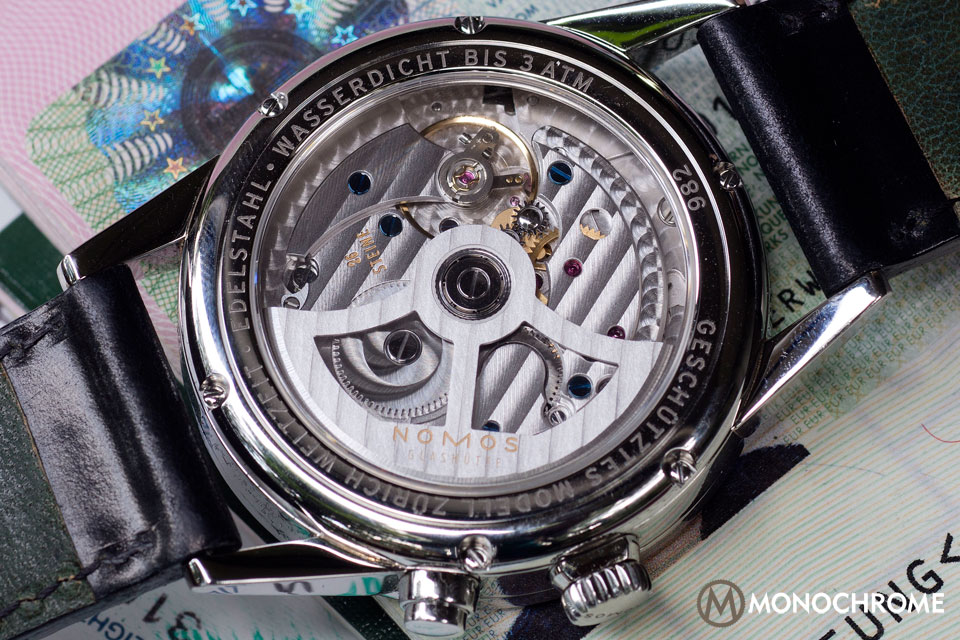
Pros & Cons
There are so many good things to say about the Zürich Weltzeit, and so little to complain about. Apart from the legibility issue (that the design aesthetics really take some getting used to), there’s pretty much nothing else to nag about. For some, the lack of a true world timer is an issue, and the classic contemporary design doesn’t exactly fit the criterion of what that type of watch buyer wants. But that’s the thing, the Zürich Weltzeit is not in any way trying to penetrate the market for such an audience. It is and will always be that understated watch that also is the company’s finest. I call it “subtle elegance”. A simple and uncluttered dial for a world timer, fitted with a superbly finished manufactured movement, and a leather strap that exudes quality. I admit, after giving the Zürich Weltzeit some wrist time, I have become extremely fond of it.
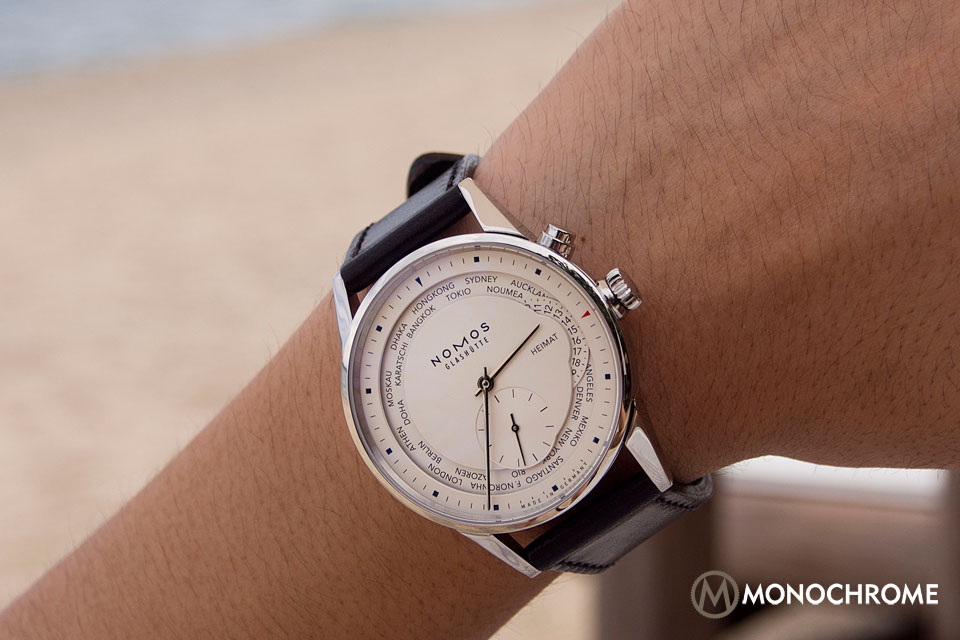
Final words
The Zürich Weltzeit by and large is perhaps Nomos’ best and most complicated timepiece to date. But surprisingly, it still holds true to the Nomos DNA of simple time telling aesthetic design. In more ways than one, this Zürich is riddled with idiosyncrasies and apparent contradictions that could potentially be disastrous to an upstart brand… A complicated piece that strives to remain simple; a German made watch named after a Swiss city; a world timer that behaves like a GMT; a supposedly understated piece that strikes up a conversation like magnets on steel – and yet therein lies its charm.
Here is a piece that needs to be discovered, a piece that is designed to be convenient yet complicated, and a piece that maybe takes some time for one to fully appreciate. Almost an acquired taste you might say, like Johann Pachelbel’s Canon in D major, which remained forgotten for centuries before being rediscovered. Scored only with three violins, double bass, and gigue, Pachelbel’s Canon seems so simple, and yet is so powerful. The same is true of the Zürich Weltzeit. Keeping it simple is the key. A world timer need not be complex, a GMT need not require calculation, a timepiece need not be overly busy. As for inspired complications, with the Zürich Weltzeit, simplicity in watch design IS the complication.
A HUGE thanks to Nomos for helping me out with all the costoms-related trouble and unforeseeable circumstances I had to undergo just to get the watch in my hands.



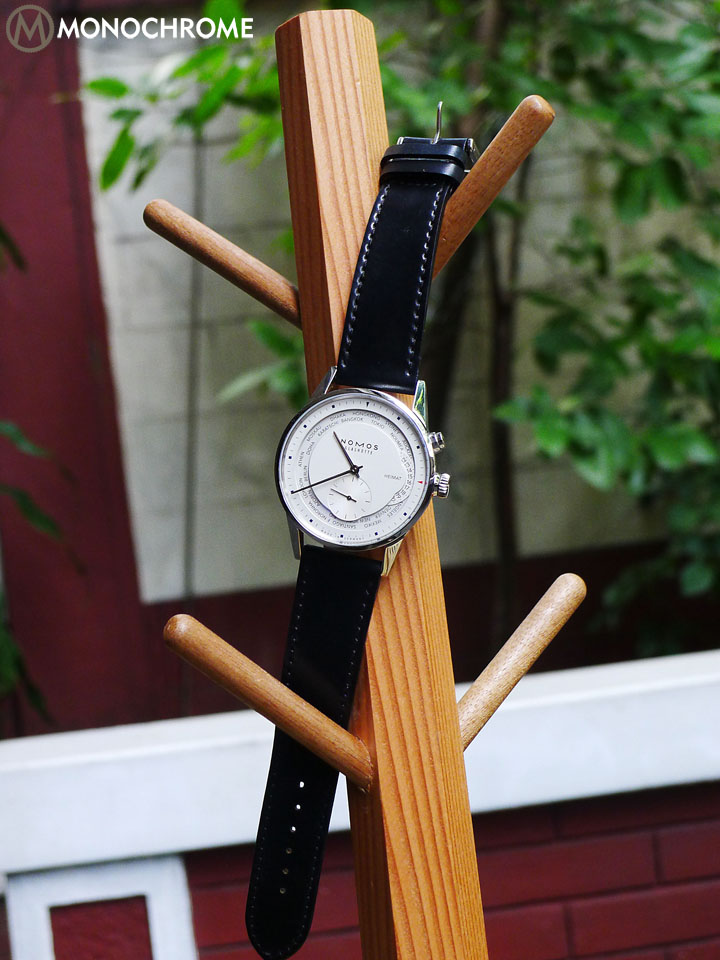
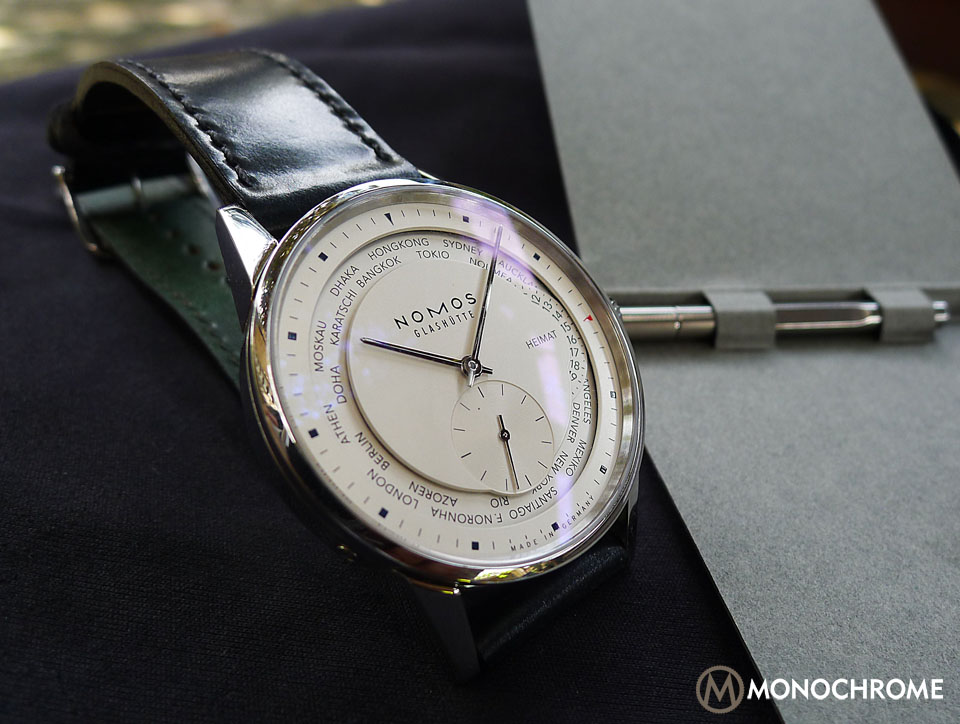


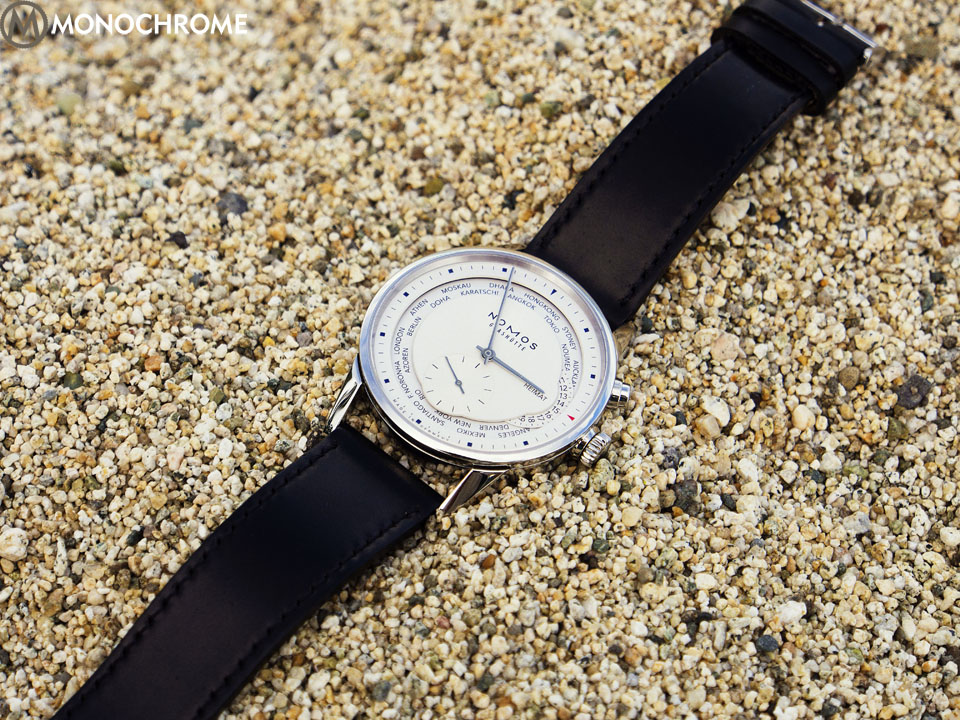

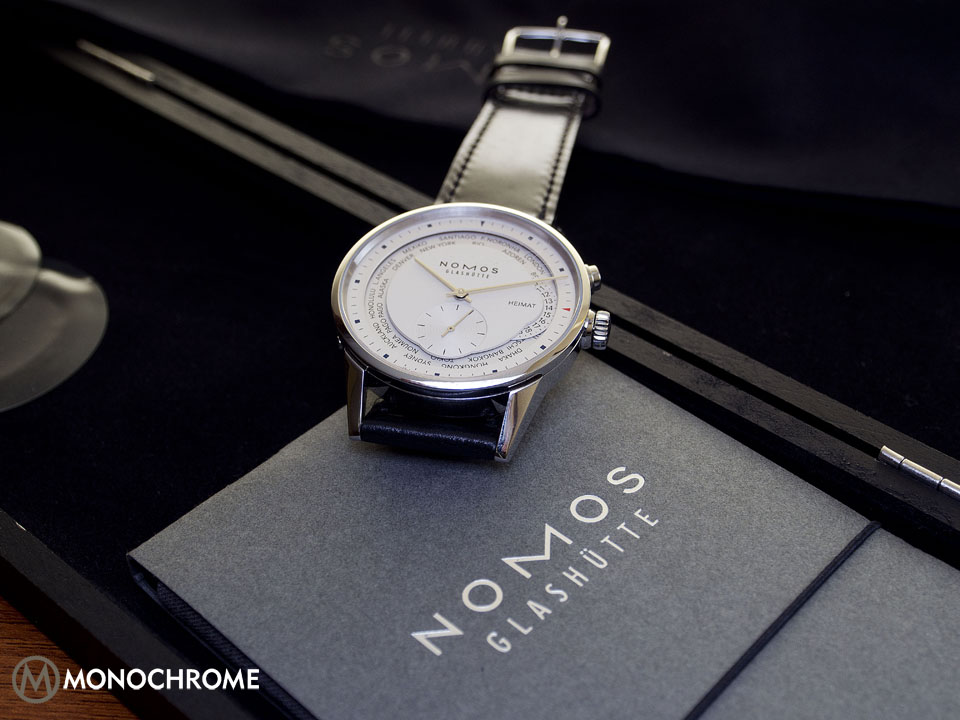
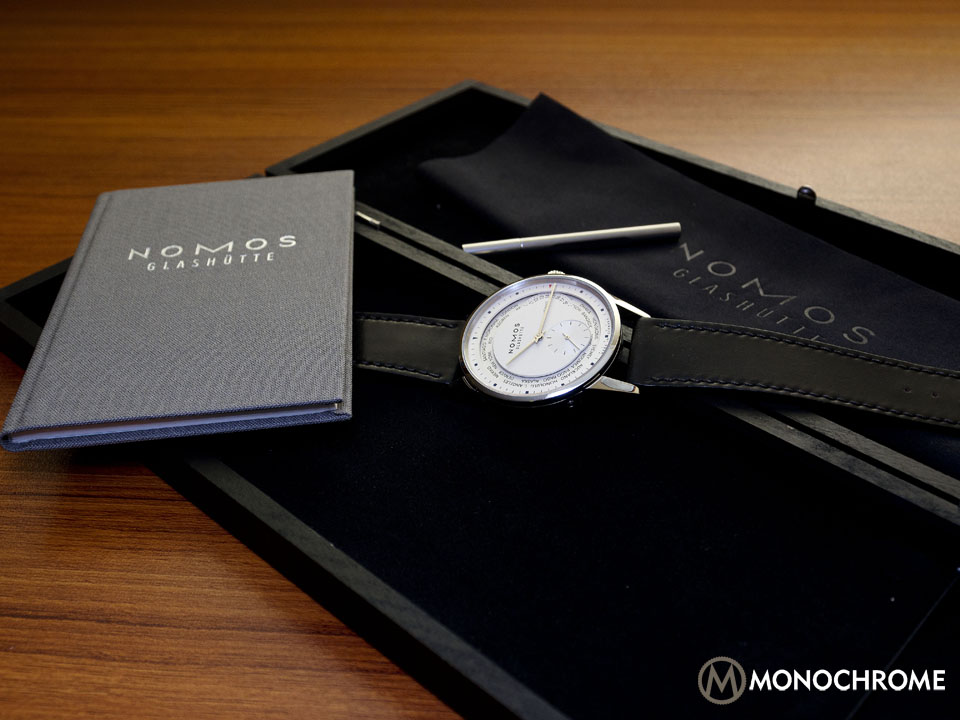
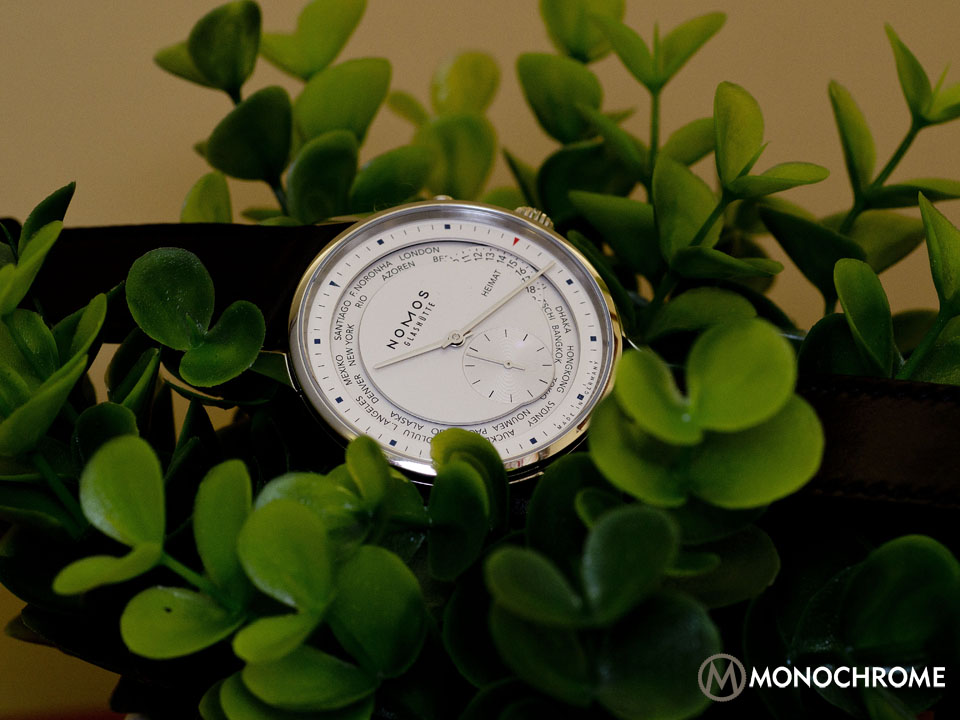

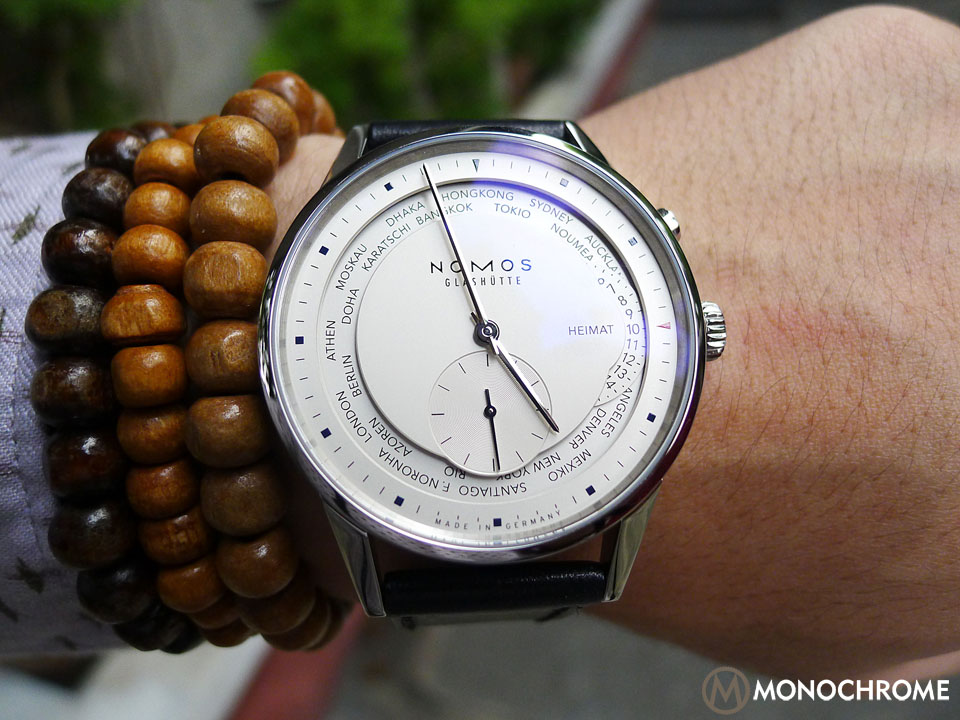



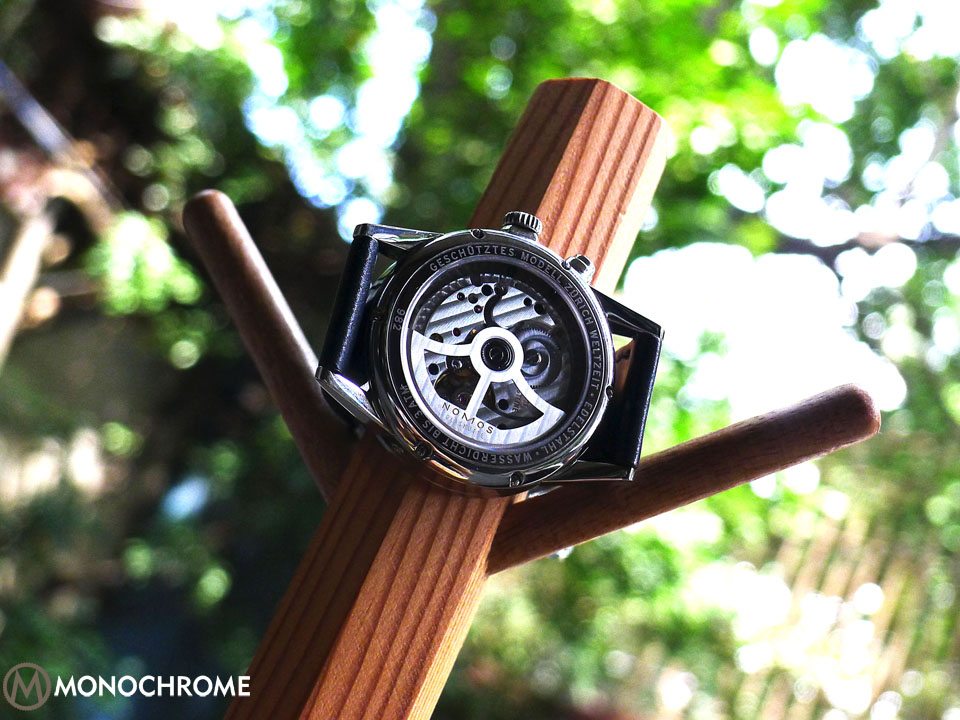


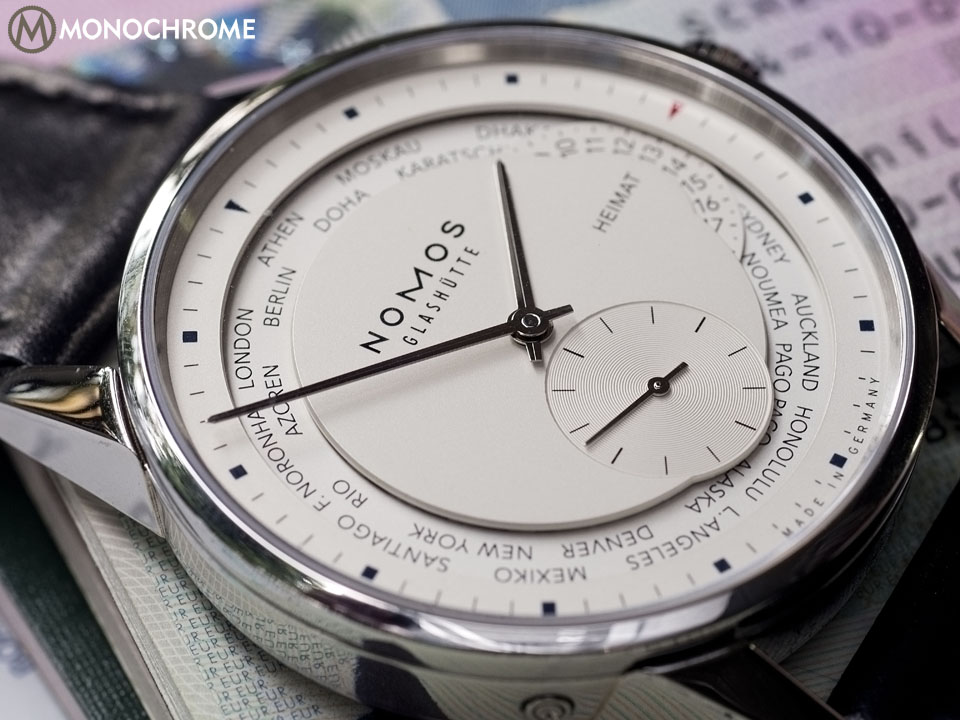


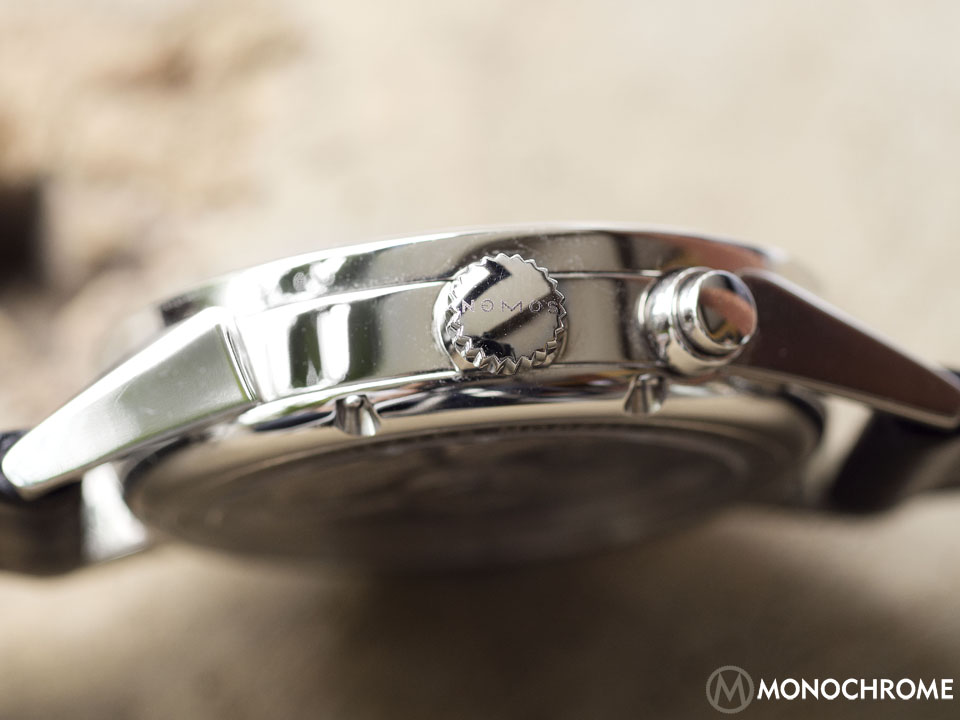
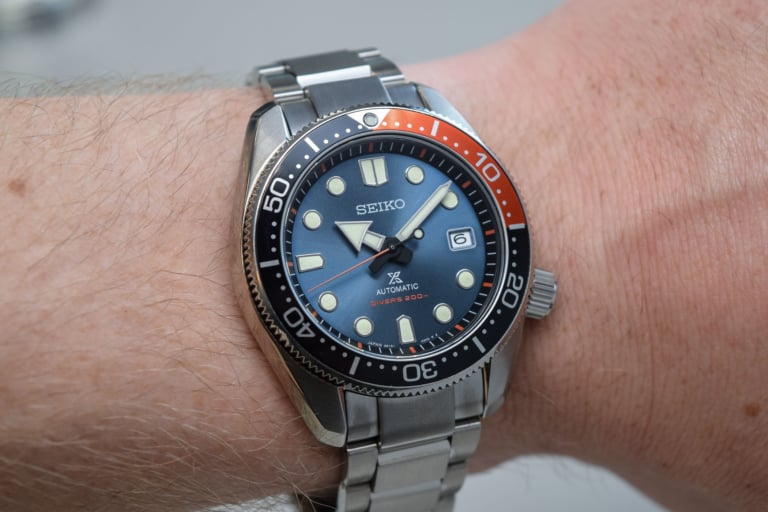
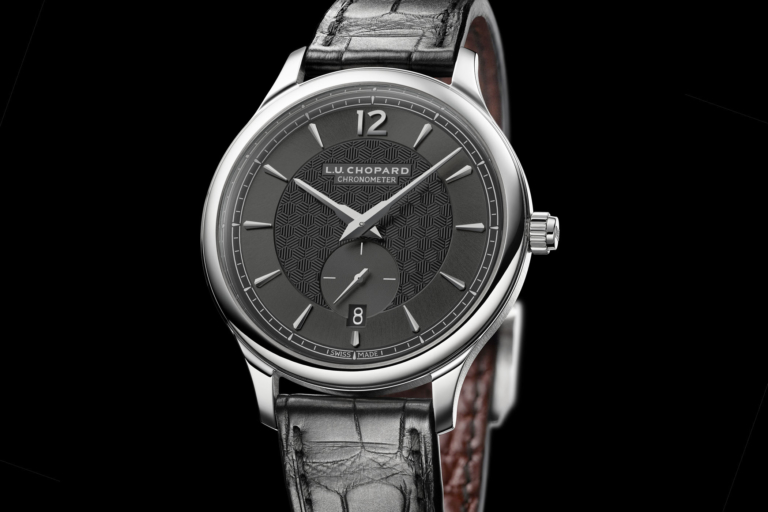
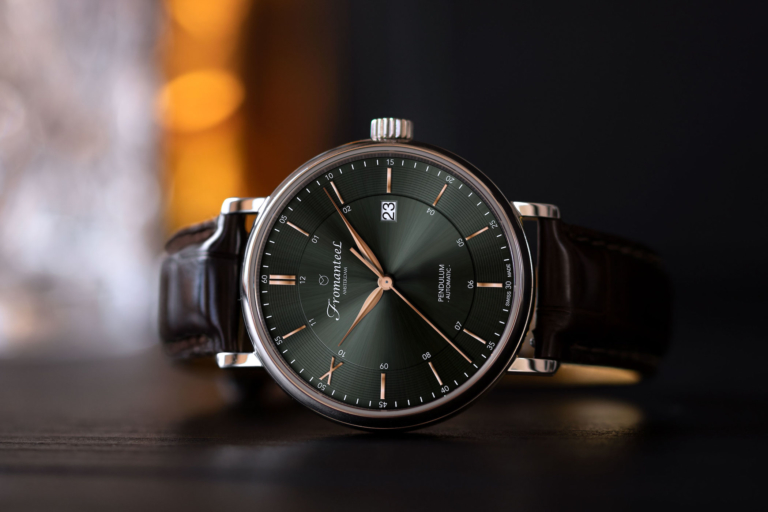
5 responses
Didnt know this one had a sapphire case-back. Excellent pics.
If you still had this watch w/ u i’d buy it haha
Thanks Marvyn, much appreciated!
If you had said it earlier I would’ve let you take a look at the piece. Unfortunately, it’s now back with the manufacturers.
What is the lug to lug size for this? What is your wrist size? Interested in buying but not sure of the size!
@Calvin, my wrist size is at around 6 and a half inch (16 cm). The piece wears big, but it won’t dominate ones wrist. Lug width on the other hand is measured at 20 mm (http://www.nomos-glashuette.com/en/watches/zuerich/weltzeit/)
I have this beautiful piece for two weeks now and it’s absolutely perfect! Have no complaints about it.